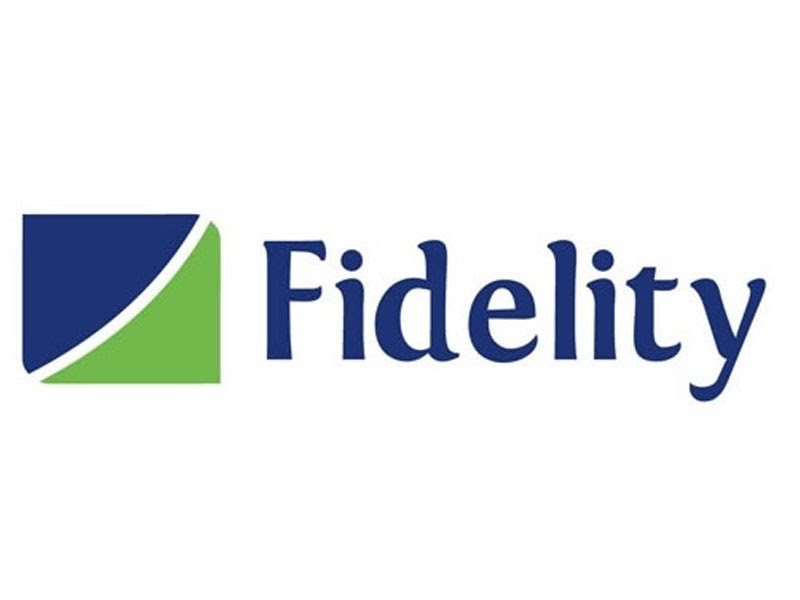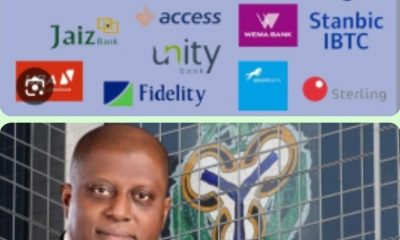Business
Who is afraid of Fidelity Bank?

Who is afraid of Fidelity Bank?
A lot of mischief is going on in the banking sub-sector of Nigeria’s financial ecosystem since the Central Bank of Nigeria (CBN), on June 3, 2024, revoked the banking licence of Heritage Bank Plc.
The not-so-subtle campaign by some faceless groups to demarket an otherwise solid financial institution like the Fidelity Bank Plc., however, has not escaped the attention of discerning banking publics. But it is a mischief taken too far.
In revoking the banking licence of Heritage Bank, the CBN made it clear that its board and management have been unable to improve the bank’s financial performance, a situation which the country’s apex bank says constitutes a threat to the country’s financial stability.
A statement by Mrs. Hakama Sidi Ali, Ag. Director, Corporate Communications of the CBN, said it acted in accordance with its mandate to promote a sound financial system in Nigeria and in exercise of its powers under Section 12 of the Banks and Other Financial Act (BOFIA) 2020.
Many Nigerians, particularly those abreast of the goings on in the banking industry did not raise any eyebrows at the news of the revocation and subsequent appointment of the Nigeria Deposit Insurance Corporation (NDIC) as the liquidator.
But since then, mischief makers have been bandying the names of other banks – Fidelity Bank, Wema Bank, Polaris Bank and Unity Bank – that will go the Heritage way. To make their spurious claims seem real, they recirculated a circular issued by CBN on January 10, 2024, notifying the public about the dissolution of the Boards of Union, Keystone, and Polaris banks as though it was issued on June 10, 2024.
And even when the CBN, while insisting that the case of the now defunct Heritage Bank was an isolated one, stated unequivocally that allegations of further revocation of licences prior to the completion of the bank recapitalisation exercise were mere fabrications of those who didn’t wish the banking sector well, such insinuations have persisted.
But the question that continues to concentrate the minds of many Nigerians is: Why Fidelity Bank? Of course, the question is pertinent because even if the January 10 notification memo dissolving the boards of Union, Keystone and Polaris banks is taken to mean that the banks were in trouble, Fidelity Bank was not one of them.
It is, however, instructive that this mischief has become more strident in the last one week since Fidelity Bank signed the necessary documentation to raise about N127.1 billion from a public offer and rights issue to its existing shareholders to raise its capital base in line with the CBN’s fresh capitalisation directive.
The bank is eyeing N97.5 billion fresh funds from its public offer and N29.6 billion from its rights issue which offers existing shareholders one new ordinary share for every 10 ordinary shares held as of January 5, 2024, at N9.25 per share. For the Public Offer, 10,000,000,000 ordinary shares of 50 kobo each will be offered to the general investing public at N9.75 per share when the acceptance and application lists for the rights issue and public offer open on Thursday, June 20, 2024.
Speaking at the signing ceremony which held at the board room of the bank’s head office in Lagos on Wednesday, June 5, the Managing Director and Chief Executive Officer, Nneka Onyeali-Ikpe, disclosed that “the proceeds of the combined offer will be applied towards investment in IT infrastructure, business and regional expansion, and investment in product distribution channels.”
With an international operating licence from the CBN, Fidelity Bank is mandated to raise its capital base to N500 billion within the next two years and for a bank that is sure of its business fundamentals, it is not a surprise that it has effectively positioned itself at the forefront of achieving the revised minimum capital requirements for Nigerian commercial banks. No other bank is yet to embark on the process.
Could that be the reason for the campaign of calumny? If it is, then those on this demarketing campaign are tactless and dim. They would have known that the campaign died even before it took off.
But the dim-wittedness of the agents of doom beggars belief. If not, how could one envisage that one of the high-flying financial institutions in Nigeria could be at the verge of being liquidated? What explanation will even the CBN give for taking such a step because the truth remains that if Fidelity Bank is declared insolvent today, then no other bank is safe.
Why?
Since Fidelity Bank was incorporated in 1987 and began operations in 1988, it has not looked back. Though it started with a Merchant Banking license, it converted to a commercial bank in 1999 in a deliberate push to grow as a private limited liability company. Yet, not satisfied with playing the second fiddle, the bank transmuted into a Public Limited Company in August of the same year. Since then, it has grown from being a marginal player to one of the industry giants, securing its universal banking license in February 2001.
In 2005 during the Chukwuma Soludo-engineered consolidation exercise, Fidelity Bank acquired the then FSB International Bank Plc. and Manny Bank Plc. to become one of the top 10 Nigerian banks. Six years after the consolidation, the bank was ranked not only the seventh most capitalised bank in Nigeria but also the 25th on the African continent. In 2011, it obtained its international banking license and following its renewed retail and digital banking drive, was ranked the fourth best bank in Nigeria in the retail market segment in the 2017 KPMG Banking Industry Customer Satisfaction Survey (BICSS).
Today, Fidelity Bank has presence in all the states and major cities in Nigeria and continues to rank among one of the ten main banks in the country by tier-one capital of nearly $1 billion.
In a report on April 11, 2024 titled, “Fidelity Bank in 2024: A Peek Under the Banking Bonnet,” Proshare, a financial services information provider wrote: “In two decades, Fidelity Bank has sweated its assets to grow gross earnings to N337.05 billion in FY 2022, with an average annual growth rate of 30.3 per cent. The group has diversified its gross earnings, averaging 16 per cent from non-interest income and 84 per cent from interest income. The consistent rise in digital income and foreign exchange gains appears to have supported the continuous rise in the lender’s non-interest income, providing a buffer for rising operating costs.”
Proshare analysts also estimated that Fidelity Bank will rise to full Tier 1 status in its next Tier 1 Banking Sector Report even as it currently leads second-tier banks in gross earnings, profitability, total assets, customer deposits, loans and advances.
In its report on the best performing banks in Q1 2024 based on pre-tax profit, Nairametrics, an online business magazine, said: “Fidelity Bank Plc. posted a pre-tax profit of N39.5 billion, marking a 120 per cent growth from the N17.9 billion pre-tax profit recorded in Q1 2023. During the quarter, the bank posted a net interest income of N99.6 billion, marking a 90 per cent YoY growth from Q1 2023. Fidelity Bank posted gross earnings of N192.1 billion during the quarter, as it also recorded a net income of N31.4 billion, up by 101 per cent YoY from N15.7 billion as of Q1 2023.”
Based on its outstanding financial performance, the bank was voted the most trusted wealth management company for 2023, earning top rankings for “financial soundness, quality of products and services, protecting privacy and security, and sensitivity to customer needs” by Investor’s Business Daily.
The odious attempt to precipitate a run on Fidelity Bank is financial sleight of hand of the worst sort. While the bank is not at any risk considering its very robust fundamentals, the banking industry may be worse for such an invidious campaign if unchecked.
Those who are trying to instigate instability in the country’s financial ecosystem should desist. Competition must not be a sleight of the hand battle.
Business
Nigeria’s Inflation Drops to 15.10% as NBS Reports Deflationary Trend

Nigeria’s headline inflation rate declined to 15.10 per cent in January 2026, marking a significant drop from 27.61 per cent recorded in January 2025, according to the latest Consumer Price Index (CPI) report released by the National Bureau of Statistics.
The report also showed that month-on-month inflation recorded a deflationary trend of –2.88 per cent, representing a 3.42 percentage-point decrease compared to December 2025. Analysts say the development signals easing price pressures across key sectors of the economy.
Food inflation stood at 8.89 per cent year-on-year, down from 29.63 per cent in January 2025. On a month-on-month basis, food prices declined by 6.02 per cent, reflecting lower costs in several staple commodities.
The data suggests a sustained downward trajectory in inflation over the past 12 months, pointing to improving macroeconomic stability.
The administration of President Bola Ahmed Tinubu has consistently attributed recent economic adjustments to ongoing fiscal and monetary reforms aimed at stabilising prices, boosting agricultural output, and strengthening domestic supply chains.
Economic analysts note that while the latest figures indicate progress, sustaining the downward trend will depend on continued policy discipline, exchange rate stability, and improvements in food production and distribution.
The January report provides one of the clearest indications yet that inflationary pressures, which surged in early 2025, may be moderating.
Bank
Alpha Morgan to Host 19th Economic Review Webinar

Alpha Morgan to Host 19th Economic Review Webinar
In an economy shaped by constant shifts, the edge often belongs to those with the right information.
On Wednesday, February 25, 2026, Alpha Morgan Bank will host the 19th edition of its Economic Review Webinar, a high-level thought leadership session designed to equip businesses, investors, and individuals with timely financial and economic insight.
The session, which will hold live on Zoom at 10:00am WAT and will feature economist Bismarck Rewane, who will examine the key signals influencing Nigeria’s economic direction in 2026, including policy trends, market movements, and global developments shaping the local landscape.
With a consistent track record of delivering clarity in uncertain times, the Alpha Morgan Economic Review continues to provide practical context for decision-making in a dynamic environment.
Registration for the 19th Alpha Morgan Economic Review is free and can be completed via https://bit.ly/registeramerseries19
It is a bi-monthly platform that is open to the public and is held virtually.
Visit www.alphamorganbank to know more.
Business
GTBank Launches Quick Airtime Loan at 2.95%

GTBank Launches Quick Airtime Loan at 2.95%
Guaranty Trust Bank Ltd (GTBank), the flagship banking franchise of GTCO Plc, Africa’s leading financial services group, today announced the launch of Quick Airtime Loan, an innovative digital solution that gives customers instant access to airtime when they run out of call credit and have limited funds in their bank accounts, ensuring customers can stay connected when it matters most.
In today’s always-on world, running out of airtime is more than a minor inconvenience. It can mean missed opportunities, disrupted plans, and lost connections, often at the very moment when funds are tight, and options are limited. Quick Airtime Loan was created to solve this problem, offering customers instant access to airtime on credit, directly from their bank. With Quick Airtime Loan, eligible GTBank customers can access from ₦100 and up to ₦10,000 by dialing *737*90#. Available across all major mobile networks in Nigeria, the service will soon expand to include data loans, further strengthening its proposition as a reliable on-demand platform.
For years, the airtime credit market has been dominated by Telcos, where charges for this service are at 15%. GTBank is now changing the narrative by offering a customer-centric, bank-led digital alternative priced at 2.95%. Built on transparency, convenience and affordability, Quick Airtime Loan has the potential to broaden access to airtime, deliver meaningful cost savings for millions of Nigerians, and redefine how financial services show up in everyday life, not just in banking moments.
Commenting on the product launch, Miriam Olusanya, Managing Director of Guaranty Trust Bank Ltd, said: “Quick Airtime Loan reflects GTBank’s continued focus on delivering digital solutions that are relevant, accessible, and built around real customer needs. The solution underscores the power of a connected financial ecosystem, combining GTBank’s digital reach and lending expertise with the capabilities of HabariPay to deliver a smooth, end-to-end experience. By leveraging unique strengths across the Group, we are able to accelerate innovation, strengthen execution, and deliver a more integrated customer experience across all our service channels.”
Importantly, Quick Airtime Loan highlights GTCO’s evolution as a fully diversified financial services group. Leveraging HabariPay’s Squad, the solution reinforces the Group’s ecosystem proposition by bringing together banking, payment technology, and digital channels to deliver intuitive, one-stop experiences for customers.
With this new product launch, Guaranty Trust Bank is extending its legacy of pioneering digital-first solutions that have redefined customer access to financial services across the industry, building on the proven strength of its widely adopted QuickCredit offering and the convenience of the Bank’s iconic *737# USSD Banking platform.
About Guaranty Trust Bank
Guaranty Trust Bank (GTBank) is the flagship banking franchise of GTCO Plc, a leading financial services group with a strong presence across Africa and the United Kingdom. The Bank is widely recognized for its leadership in digital banking, customer experience, and innovative financial solutions that deliver value to individuals, businesses, and communities.
About HabariPay
HabariPay is the payments fintech subsidiary of GTCO Plc, focused on enabling fast, secure, and accessible digital payments for individuals and businesses. By integrating payments and digital technology, HabariPay supports innovative services that make everyday financial interactions simpler and more seamless.
Enquiries:
GTCO
Group Corporate Communication
[email protected]
+234-1-2715227
www.gtcoplc.com
-

 celebrity radar - gossips6 months ago
celebrity radar - gossips6 months agoWhy Babangida’s Hilltop Home Became Nigeria’s Political “Mecca”
-

 society6 months ago
society6 months agoPower is a Loan, Not a Possession: The Sacred Duty of Planting People
-

 society5 months ago
society5 months agoReligion: Africa’s Oldest Weapon of Enslavement and the Forgotten Truth
-

 news6 months ago
news6 months agoTHE APPOINTMENT OF WASIU AYINDE BY THE FEDERAL GOVERNMENT AS AN AMBASSADOR SOUNDS EMBARRASSING









